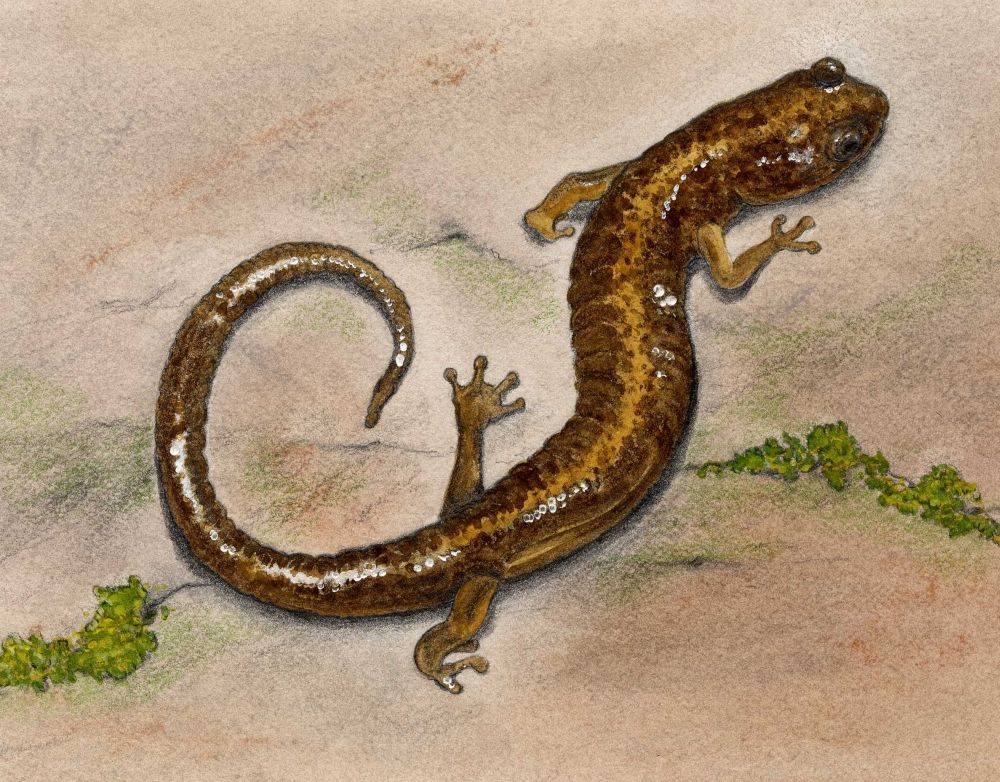
Shenandoah Salamander
Latin name: Plethodon Shenandoah,Conservsation status: vulnerable (population is stable)
The Shenandoah Salamander has no lungs—it "breathes" through its skin. A tail or toes lost to a predator will re-grow in a few weeks.
The Shenandoah Salamander lives in an isolated, high altitude region of Shenandoah National Park, USA. Like all amphibians who have thin, permeable skin, salamanders are very sensitive to environmental changes. If average temperatures or moisture increase, this salamander, restricted to its cool micro-climate, will be at risk—having no place to go but to lower, even warmer, altitudes. If warming causes other species of lower altitude salamanders to migrate higher, they will compete for the Shenandoah's cool, moist habitats.
Other animals effected by climate change
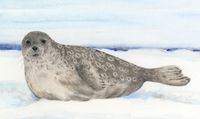 Ringed Seal
Ringed SealAll populations of Ringed Seals are expected to be adversely affected by climate change because of dependence on sea ice and snow dens for breeding, protecting pups, moulting and resting. Early warming causes pups to separate prematurely from their mothers. As sea ice declines, other threats are fisheries by-catch, increased shipping, tourism and development. Seals are vulnerable to disease from heavy concentrations of pollutants that have accumulated in the Arctic food web.
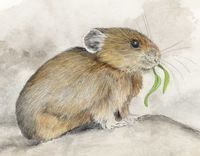 American Pika
American PikaAmerican pikas occupy talus—rock piles that accumulate at the base of a slope—at high elevations in western mountains. Pikas are thought to be a prime example of the potential effects of climate change because they are sensitive to warm temperatures and rely on insulation provided by snow to survive cold winter temperatures. However, several recent studies indicate that pikas can be resilient to each of these factors. Most pikas in the Sierra Nevada survived the winter of 2014, when there was almost no snowpack. Pikas persist in many hot localities as well, demonstrating their ability to cope with high temperatures.
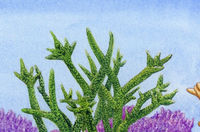 Staghorn Coral
Staghorn CoralIn the last 30 years the Staghorn Coral population has decreased by 80% from disease, pollution, development and damage. Climate change is increasing the risk of extinction. Corals live in symbiotic (mutually beneficial) relation with algae. The coral receives nutrients and oxygen from algae, and the algae receive nutrients and carbon dioxide from the coral. Rising sea temperature increases algae growth so oxygen levels become too high for the coral, causing "bleaching"—the coral expels the algae and dies. Higher ocean acidity contributes to bleaching and also reduces the ability of corals and other marine animals to build hard shells. Other threats from climate change are sea level rise, changes in currents and storm damage.
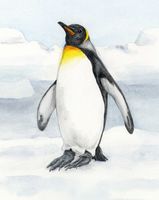 Emperor Penguin
Emperor PenguinIn 50 years, the mean temperature of western Antarctica has risen nearly 3 °C—more than any other region—reducing the extent and thickness of winter ice. The Emperor Penguin is dependent on the ice for breeding, raising chicks and moulting. Less sea ice decreases zooplankton (krill) which feed on algae that grow on the underside of the ice. Krill are an important part of the food web for the Emperor and other Antarctic marine species.
